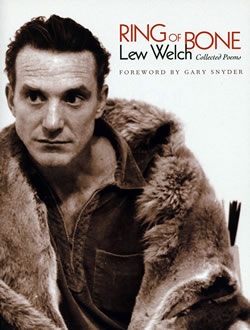Lew Welch
In our Sierra story, the Beat Generation is an influential and often forgotten factor in how we perceive and protect the Range of Light.
As with any cultural movement, it is difficult to assign a clear catalyst for the Beat Generation. The Beats had roots in skepticism of modern industrial life and a longing to return to a more natural, unspoiled existence. Building upon the radical idealism of Walt Whitman, Henry David Thoreau and the visionary perceptions of even earlier commentators like William Blake, the Beats were cynics, extolling an alternative to what they viewed as a stifling, manipulative postwar ethos.
The Beats Embraced Nature
The Beats were looking for a more pure and simple life that embraced a distinctive, uncensored societal experimentation and rejected cultural orthodoxy. Many Beats adopted Buddhist philosophy that emphasized affection for all creatures and the inner tranquility provided by an intimate and equal relationship with nature. Beats were also keenly attuned to the internal value of the natural world as expressed by John of the Mountains, John Muir. In the words of Allen Ginsberg, pioneer Beat Poet, "That’s what the whole Beat Generation is, if it’s anything—prophets howling in the wilderness against a crazy civilization."
In the late 1940s, the label "Beat Generation" was applied to this group by groundbreaking novelist Jack Kerouac. The term is variously described as having its origin in underworld slang for downtrodden or in a spiritual context of beatitude, but perhaps one of Kerouac’s alternative names is most instructive. Kerouac considered calling this band the "Found Generation," a new notion comparable to the Lost Generation of the 1920s.
Welch, the Tragic Son
Lew Welch would become the tragic son of the Beat Movement. Born in Arizona in 1929, Welch moved to California at an early age and, following World War II, he attended Stockton Junior College, where he became interested in the writings of Gertrude Stein. In 1948, Welch move to Portland, Oregon, to attend Reed College. His roommate was Gary Snyder. Lew Welch wrote a dissertation on Gertrude Stein, published some poems, and was gaining notice in literary circles, most notably by modernist poet William Carlos Williams, who tried to get Welch’s Stein research published.
Following college, Welch moved to New York City, and later Chicago, where he was an advertising copywriter. Wanting to pursue poetry, Welch joined his friend Snyder in San Francisco. Soon he was fired from his advertising job and made a living working on a salmon boat in the San Francisco Bay. He began writing increasingly biocentric poems that reflected his rejection of corporate values and belief in the power of closeness with nature. Welch entered fully into the Beat Culture in the 1960s, performing his poems widely and living on a commune. He even taught poetry workshops for the University of California Extension Program for five years. In his 1962 novel Big Sur, Jack Kerouac based the character of David Wain on Welch.
Welch Goes Into Decline
But Lew Welch had demons. He had been in therapy, undergoing treatment for emotional and mental problems. Welch spent more and more time in the wild, rejecting modern conveniences and relying almost totally on natural resources, living "off the grid." He was physically transforming into a man of the wilderness and an individual searching for answers in his own internal wilderness. Welch was attempting, as he wrote in one of his poems, to "[kick] the habit, finally, of Self, of man-hooked Man." He grew darker in outlook. He struggled with alcoholism, and a long-term relationship with Polish refugee Magda Cregg ended. Welch was 44 and struggling to find enlightenment in his increasingly murky existence.
In 1971, while staying with Gary Snyder at Snyder’s home in North San Juan, a few miles north of Nevada City, Welch wrote a poem entitled "Song of the Turkey Buzzard," a reflection on death and the possibility of rebirth. Welch wrote of "the very opposite of death, bird of rebirth, Buzzard…meat is rotten meat made sweet again." It was a premonition for what happened next. On May 23, 1971, Lew Welch walked out of Snyder’s rural compound carrying his rifle. He left behind a suicide note. His body was never found. Lew Welch had achieved his ultimate union with nature.
Welch's Step-Son Still Rocks
Welch’s legacy remains not only through his literary output, but through the son of his companion Magda Cregg. When Welch met her, Magda had a young son named Hugh Anthony Cregg III. Welch would be little Hugh’s stepfather and Hugh came to admire and respect his often freethinking father figure. When Hugh reached adulthood and entered into a musical career, he adopted his stepfather’s first name as part of a new stage persona. Hugh Cregg became Huey Lewis, award-winning front man for the best-selling musical act Huey Lewis and the News.
Image Credits:
- Book Cover for Lew Welch’s Ring of Bone. Source: Photo by City Lights Publishers, San Francisco
